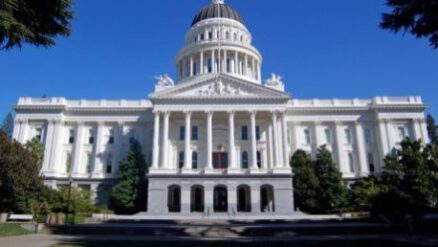This bill is part of the 2024 Cannabis Bills section of our ongoing update on California Cannabis Legislation – see the full California Cannabis Law Legislative Update which includes information on cannabis bills from other years.
AB 2643 (Wood D) Cannabis cultivation: environmental remediation.
(Update: On 9.28.24, AB 2643 was signed by the Governor.)
(1) Existing law requires the Department of Fish and Wildlife to establish the watershed enforcement program to facilitate the investigation, enforcement, and prosecution of offenses relating to unlawful water diversions and other violations of the Fish and Game Code associated with cannabis cultivation. Existing law also requires the department, in coordination with specified state agencies, to establish a permanent multiagency task force to address the environmental impacts of cannabis cultivation.
This bill would require the department to conduct a study to create a framework for cannabis site restoration projects with the goal of providing guidance for the cleanup, remediation, and restoration of environmental damage caused by cannabis cultivation, and to complete the study by January 1, 2027, as specified. The bill would authorize the department to enter into an agreement with a nongovernmental organization or educational institution for that entity to conduct the study.
The bill would require the department to submit an annual report to the Legislature until January 1, 2036, on illicit cannabis cultivation and on the status of efforts to repair habitat degradation and other environmental damage in watersheds affected by cannabis cultivation on both public and private lands, as specified.
(2) Existing law, the Control, Regulate and Tax Adult Use of Marijuana Act (AUMA), an initiative measure approved as Proposition 64 at the November 8, 2016, statewide general election, authorizes a person who obtains a state license under AUMA to engage in commercial adult-use cannabis activity pursuant to that license and applicable local ordinances. Existing law, the Medicinal and Adult-Use Cannabis Regulation and Safety Act (MAUCRSA), among other things, consolidates the licensure and regulation of commercial medicinal and adult-use cannabis activities.
MAUCRSA prohibits cannabis and cannabis products from being sold unless a representative sample of specified batches has been tested by a licensed testing laboratory. MAUCRSA requires the testing laboratory to issue a certificate of analysis for selected lots of each batch to report specified information, including the content of specified compounds and contaminants. In establishing the levels of contaminants for these purposes, MAUCRSA requires the Department of Cannabis Control to consider the American Herbal Pharmacopoeia monograph, specified pesticide guidelines set by the Department of Pesticide Regulation, and any other relevant source.
This bill would require the Department of Cannabis Control to annually review the summary included in the above-described annual report of toxic materials, pesticides, fertilizers, and other chemicals found at illicit cannabis cultivation sites and, based on that review, consider whether the types of contaminants tested for these purposes, or the level established for a particular contaminant, should be updated.
(3) Existing law imposes various civil penalties for violations of specified environmental laws in connection with the production or cultivation of a controlled substance, as specified. Existing law defines controlled substance for this purpose to mean a drug, substance, or immediate precursor listed in any of the schedules established pursuant to the California Uniform Controlled Substances Act. Existing law requires 40% of civil penalties imposed or collected by a court, and 50% of administrative penalties imposed or collected by the department, for violations of these provisions to be deposited into the Timber Regulation and Forest Restoration Fund and used for grants for certain environmental purposes, as specified.
This bill, with regard to the above-described civil penalties, would replace the term “controlled substance” with the term “cannabis or cannabis products.” The bill would eliminate those apportionments to the Timber Regulation and Forest Restoration Fund and would instead direct those apportionments to the Cannabis-Impacted Lands Restoration Fund, which the bill would create. The bill would continuously appropriate moneys in that fund to the department for the remediation and restoration of lands impacted by cannabis cultivation on public or private lands. The bill would also eliminate requirements that moneys from these penalties be deposited into the Timber Regulation and Forest Restoration Fund under certain circumstances for the repayment of a loan authorized from that fund to the department.
(4) Existing law, the Control, Regulate and Tax Adult Use of Marijuana Act (AUMA), as additionally amended by statute, establishes the California Cannabis Tax Fund as a continuously appropriated fund consisting of specified taxes, interest, penalties, and other amounts related to commercial cannabis activity. Each fiscal year, AUMA requires the Controller to make disbursements from the fund pursuant to a specified schedule, including, among others, amounts to the Environmental Restoration and Protection Account. Of the amount deposited into the Environmental Restoration and Protection Account, AUMA requires the Controller to disburse the funds to the Department of Fish and Wildlife and the Department of Parks and Recreation for, among other things, the cleanup, remediation, and restoration of environmental damage in watersheds affected by cannabis cultivation and related activities, as specified, and to support local partnerships for this purpose.
This bill would direct the Department of Fish and Wildlife to use moneys made available from that account for those purposes to fund a study, biannual meetings, and reports, as specified.
(5) AUMA authorizes the Legislature to amend its provisions with a 2/3 vote of both houses to further its purposes and intent, except as specified. This bill would declare that its provisions further the purposes and intent of AUMA.
Read more about California Cannabis Legislation – see the full California Cannabis Law Legislative Update.
Contact us by phone or email to learn more about California cannabis law including state, county or city cannabis licensing and cannabis regulations, cannabis regulatory compliance, and cannabis litigation.

